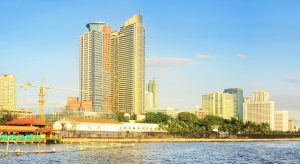Philippine President Ferdinand Marcos Jr. has ordered an indefinite suspension of 22 major land reclamation projects in Manila Bay to allow a study of their environmental impact and legal compliance, an official said Thursday.
Marcos’s order came after the United States expressed public concern over environmental damage from the projects and the involvement of a Chinese company blacklisted by Washington for its role in building militarized Chinese island bases in the South China Sea that further stoked tensions in the contested waters.
The heavily fortified U.S. Embassy in Manila sits on the edge of the bay, which is popular for its golden sunsets but has long been notorious for pollution.
“All of these projects are suspended at this point,” Environment Secretary Antonia Yulo Loyzaga said in a televised news conference. “All are under review.”
A team of scientists including oceanographers, geologists, and climate change experts is being formed to review ongoing and planned reclamation projects that were approved by the previous administration, she said.
Environmental groups have staged protests against the projects, mostly conducted by real estate companies seeking to build islands for upscale hotels, casinos, restaurants, and entertainment centers in the bay.
With a 190-kilometer (118-mile) coastline, the bay straddles the densely populated capital region of metropolitan Manila and several provincial regions.
Many shantytowns, factories, businesses, and residential areas have discharged their waste directly into the bay for decades, prompting the Supreme Court in 2008 to order government agencies to clean up the polluted water to make it fit for swimming.
The U.S. Embassy said last week that it has relayed its concerns to Philippine officials “about the potential negative long-term and irreversible impacts to the environment, the resilience to natural hazards of Manila and nearby areas, and to commerce” from the reclamation.
“We are also concerned that the projects have ties to the China Communications Construction Co., which has been added to the U.S. Department of Commerce’s Entity List for its role in helping the Chinese military construct and militarize artificial islands in the South China Sea,” embassy spokesperson Kanishka Gangopadhyay said in a statement.
Chinese companies on the list are restricted from trading with any U.S. firms without a nearly unobtainable special license. China has protested the U.S. sanctions as illegal.
State-owned China Communications Construction Co. has said that one of its subsidiaries, China Harbor Engineering Company Ltd., is involved in a project that includes building three artificial islands in the bay near suburban Pasay city.
A 2016 decision by an arbitration tribunal set up in The Hague under the U.N. Convention on the Law of the Sea invalidated China’s expansive claims in the South China Sea on historical grounds. But China did not participate in the arbitration, rejected its ruling, and continues to defy it.
Washington does not claim any of the South China Sea but has said that freedom of navigation and overflight in the strategic passage — where a big chunk of the world’s trade transits — and the peaceful resolution of the decades-long territorial disputes are in the U.S. national interest.
China has turned at least seven disputed reefs into what are now missile-protected island bases in the past decade, alarming the United States along with Beijing’s rival claimant states and intensifying tensions in a region long seen as a potential Asian flashpoint.
The territorial conflicts have become a delicate front in the China-U.S. rivalry. U.S. warships and fighter jets have patrolled the disputed waters to challenge China’s expansive territorial claims, often provoking Chinese warnings for the U.S. to stop meddling in the disputes or face unspecified repercussions.

































